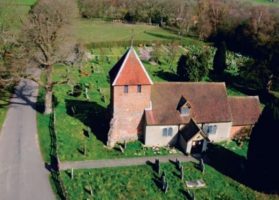Family
Arthur George West was born on 10 November 1893 at Mulfords Hill, Tadley.
His parents were Andrew and Elizabeth Alice West (née Long). In 1893 his father was recorded as a ‘General Labourer’ but two years earlier, in the 1891 Census, he more specifically states he was a ‘Broom Maker’.
Arthur was the eldest of 13 children, three of whom died prematurely: Arthur, Cyril Percy, Edith Louisa, Robert, William, Herbert, Joseph, Ernest and Victor (twins) and Dorothy May.
In the 1901 Pamber Census he was aged 7 years and recorded at Pamber Heath with his maternal grandparents Charles and Ocean Long. His parents and three siblings are living in Newtown, Tadley. His grandparents had been the publicans of ‘The Hatchet’ beer house on Silchester Road, Pamber Heath, in the late 19th century.
By 1911, aged 18 years, he was living with his parents and siblings in Newtown, Tadley. His occupation was listed as ‘General Labourer’.
Arthur was unmarried.
Service record
Arthur enlisted in Basingstoke and initially served in the Hampshire Regiment (service number 30644). He was transferred to the 6th (Service) Battalion of the Duke of Cornwall’s Light Infantry (service number 260170) early in 1917.
The 6th (Service) Battalion was raised in Bodmin in August 1914 as part of Kitchener’s First New Army (K1) and joined the 43rd Brigade, 14th (Light) Division. It trained at Aldershot and spent the winter at Witley in Surrey, returning to Aldershot in February 1915.
Later that year the battalion proceeded to France, landing at Boulogne on 22 May 1915. It fought in the action of Hooge (30 July), when the Germans first used flamethrowers in a concerted action against British trenches. Casualties were caused mainly by soldiers being flushed into the open and shot by more conventional means rather than from the flames themselves. Later, the battalion was in action in the Second Attack on Bellewaarde (25 September). In 1916 it was on the Somme seeing action in the Battle of Delville Wood (15 July – 3 September) and the Battle of Flers-Courcelette (15-22 September).
In 1917 the 14th Division fought in the German retreat to the Hindenberg Line, the First
(9-14 April) and Third (3-4 May) Battles of the Scarpe at Arras, in the second phase of the Third Battle of Ypres (Passchendaele) at Langemarck between 16-18 August 1917.
Arthur was wounded at the Battle of Langemarck and later moved to Wimeraux Military Hospital near Boulogne, where he died of wounds.
Died
Arthur died on Sunday 9 September 1917, aged 23.
Commemorated
He is buried in Wimereux Communal Cemetery [VI A 21A], Pas de Calais, France.
The inscription on his headstone reads: ‘Not gone from memory, not gone from love, but gone to a better home above’.
He is also remembered on Tadley War Memorial and the Tadley United Reformed Church Roll of Honour.
Decorations
Arthur was awarded the Victory medal and the British War medal. These would have been sent to his family.

